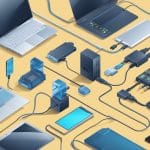Types Of Personal Computers
What are types of personal computers? The rise of technology has also coincided with the rise of convenience, and one such device which makes our lives easier, our communication faster, and our planning more precise is the personal computer. Displayed proudly on a desk, carried in a bag or a pocket, these devices have forever changed the way we interact with the world. Information can be gathered with a simple search, locations given or recommended, friends invited. This article will explore several personal computer options and their advantages.
Desktops are stationary and range from the extremely affordable to the incredibly expensive, depending upon what the device is built for and its functions. For example, gaming PCs can be bought in stores or built part-by-part by those with the skills to do so, but they are specifically designed for gaming enthusiasts and their needs. Performance PCs, on the other hand, might be better for those engaged in digital design and have a more powerful GPU (Graphics Processing Unit) than other desktops. People in the music industry who wish to create music at home or in the studio will undoubtedly search for desktops which feature the very best sound cards and MIDI components. As far as types of personal computers go, desktops and some of the most diverse in catering to a buyer’s needs.
Laptops and notebooks are geared toward people who need technology on the go. They can vary in price according to features such as amount of memory, graphics cards, processing power, hard disk, and particularly for any mobile device, the size-to-weight ratio. Some laptops are manufactured with a large screen, but are quite heavy; on the other hand, similarly sized laptops can weigh significantly less, but cost more. These types of personal computers may also be catered to the user, though for the buyer who frequently has a laptop in transport, a lightweight option might be best. For the user who simply wants more mobility at home, the weight becomes less a factor and instead, the buyer might lean more toward models specifically catered to his or her interests.
Tablets, such as the iPad or the Nexus 7, are types of personal computers which fit neatly into a small bag or purse, can connect to wireless internet, and offer a variety of services to the user, including the ability to download a wide array of applications. For serious typists, external keyboards may be a necessary purchase, though for most, the iPad is simply a convenient way to take a digital device anywhere, anytime. With photo and video options, sound editing software, games, internet access, and more, these types of personal computers offer a bit of everything to the user.
Smartphones may also be considered types of personal computers. Many service plans offer wireless data plans, meaning the buyer can connect to the internet no matter the location. Smartphones such as the Motorola Droid and Apple iPhone are priced based on storage space and provider plans, but offer similar services and features to tablets, including GPS systems for navigating foreign locations. The iPhone, for example, features voice recognition software which offers directions or recommendations for places such as stores or restaurants, takes notes, or makes calls when prompted.






